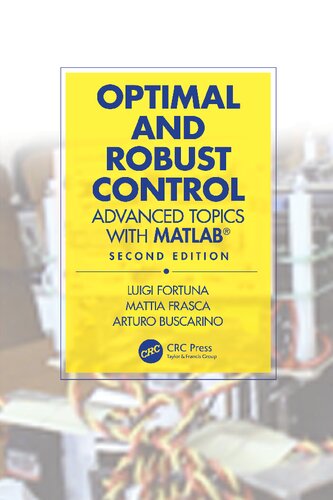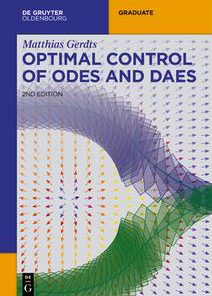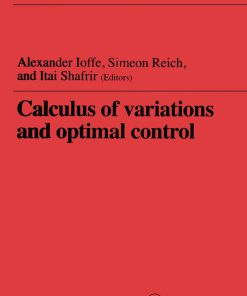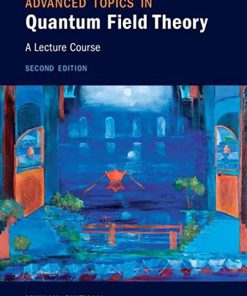Optimal and Robust Control: Advanced Topics with MATLAB 2nd Edition by Fortuna, Luigi, Frasca, Mattia, Buscarino, Arturo ISBN 1032053003 9781032053004
$50.00 Original price was: $50.00.$25.00Current price is: $25.00.
Optimal and Robust Control: Advanced Topics with MATLAB 2nd Edition by Fortuna, Luigi, Frasca, Mattia, Buscarino, Arturo – Ebook PDF Instant Download/Delivery: 1032053003, 9781032053004
Full download Optimal and Robust Control: Advanced Topics with MATLAB 2nd Edition after payment

Product details:
ISBN 10: 1032053003
ISBN 13: 9781032053004
Author: Fortuna, Luigi, Frasca, Mattia, Buscarino, Arturo
This enhanced version includes multiple-choice questions for each chapter allowing readers test their understanding on specific topics. Link to the Solutions Manual for end-of chapter exercises is provided to support student-learning. There are many books on advanced control for specialists, but not many present these topics for non-specialists. Assuming only a basic knowledge of automatic control and signals and systems, this second edition of Optimal and Robust Control offers a straightforward, self-contained handbook of advanced topics and tools in automatic control. The book deals with advanced automatic control techniques, paying particular attention to robustness-the ability to guarantee stability in the presence of uncertainty. It explains advanced techniques for handling uncertainty and optimizing the control loop. It also details analytical strategies for obtaining reduced order models. The authors then propose using the Linear Matrix Inequality (LMI) technique as a unifying tool to solve many types of advanced control problems. Topics covered in the book include, LQR and H∞ approaches Kalman and singular value decomposition Open-loop balancing and reduced order models Closed-loop balancing Positive-real systems, bounded-real systems, and imaginary-negative systems Criteria for stability control Time-delay systems This easy-to-read text presents the essential theoretical background and provides numerous examples and MATLAB® exercises to help the reader efficiently acquire new skills. Written for electrical, electronic, computer science, space, and automation engineers interested in automatic control, this book can also be used for self-study of for a one-semester course in robust control. This fully renewed second edition of the book also includes new fundamental topics such as Lyapunov functions for stability, variational calculus, formulation in terms of optimization problems of matrix algebraic equations, negative-imaginary systems, and time-delay systems.
Optimal and Robust Control: Advanced Topics with MATLAB 2nd Table of contents:
1. Modelling of Uncertain Systems and the Robust Control Problem
1.1 Uncertainty and Robust Control
1.2 The Essential Chronology of Major Findings in Robust Control
2. Fundamentals of Stability
2.1 Lyapunov Criteria
2.2 Positive Definite Matrices
2.3 Lyapunov Theory for Linear Time-Invariant Systems
2.4 Lyapunov Equations
2.5 Stability with Uncertainty
2.6 Further Results on the Lyapunov Theory
2.6.1 Hystorical Notes
2.6.2 Lyapunov Stability
2.7 Exercises
3. Kalman Canonical Decomposition
3.1 Introduction
3.2 Controllability Canonical Partition
3.3 Observability Canonical Partition
3.4 General Partition
3.5 Remarks on Kalman Decomposition
3.6 Exercises
4. Singular Value Decomposition
4.1 Singular Values of a Matrix
4.2 Spectral Norm and Condition Number of a Matrix
4.3 Exercises
5. Open-loop Balanced Realization
5.1 Controllability and Observability Gramians
5.2 Principal Component Analysis
5.3 Principal Component Analysis Applied to Linear Systems
5.4 State Transformations of Gramians
5.5 Singular Values of Linear Time-invariant Systems
5.6 Computing the Open-loop Balanced Realization
5.7 Balanced Realization for Discrete-time Linear Systems
5.8 Exercises
6. Reduced Order Models and Symmetric Systems
6.1 Reduced Order Models Based on the Open-loop Balanced Realization
6.1.1 Direct Truncation Method
6.1.2 Singular Perturbation Method
6.2 Reduced Order Model Exercises
6.3 Symmetric Systems
6.3.1 Reduced Order Models for SISO Systems
6.3.2 Properties of Symmetric Systems
6.3.3 The Cross-gramian Matrix
6.3.4 Relations Between Wc2, Wo2 and Wco
6.3.5 Open-loop Parameterization
6.3.6 Relation Between the Cauchy Index and the Hankel Matrix
6.3.7 Singular Values for a FIR Filter
6.3.8 Singular Values of All-pass Systems
6.4 Exercises
7. Variational Calculus and Linear Quadratic Optimal Control
7.1 Variational Calculus: An Introduction
7.2 The Lagrange Method
7.3 Towards Optimal Control
7.4 LQR Optimal Control
7.5 Hamiltonian Matrices
7.6 Solving the Riccati Equation via the Hamiltonian Matrix
7.7 The Control Algebraic Riccati Equation
7.8 Optimal Control for SISO Systems
7.9 Linear Quadratic Regulator with Cross-weighted Cost
7.10 Finite-horizon Linear Quadratic Regulator
7.11 Optimal Control for Discrete-time Linear Systems
7.12 Exercises
8. Closed-loop Balanced Realization
8.1 Synthesis of a Compensator for High-Order Systems
8.2 Filtering Algebraic Riccati Equation
8.3 Computing the Closed-loop Balanced Realization
8.4 Procedure for Closed-loop Balanced Realization
8.5 Reduced Order Models Based on Closed-loop Balanced Realization
8.6 Closed-loop Balanced Realization for Symmetric Systems
8.7 Exercises
9. Positive-real, Bounded-real and Negative-imaginary Systems
9.1 Passive Systems
9.1.1 Passivity in the Frequency Domain
9.1.2 Passivity in the Time Domain
9.1.3 Factorizing Positive-real Functions
9.1.4 Passive Reduced Order Models
9.1.5 Energy Considerations Connected to the Positive-real Lemma
9.1.6 Closed-loop Stability and Positive-real Systems
9.1.7 Optimal Gain for Loss-less Systems
9.2 Circuit Implementation of Positive-real Systems
9.3 Bounded-real Systems
9.3.1 Properties of Bounded-real Systems
9.3.2 Bounded-real Reduced Order Models
9.4 Relationship Between Passive and Bounded-real Systems
9.5 Negative-imaginary Systems
9.5.1 Characterization of Negative-imaginary Systems in the Frequency Domain
9.5.2 Characterization of Negative-imaginary Systems in the Time Domain
9.5.3 Closed-loop Stability and Negative-imaginary Systems
9.6 Exercises
10. Enforcing the Positive-real or the Negative-imaginary Property in a Linear Model
10.1 Why to Enforce the Positive-real and Negative-Imaginary Property in a Linear Model
10.2 Passification
10.3 Forward Action to make a System Negative-Imaginary
10.3.1 The SISO Case
10.3.2 The MIMO Case
10.4 Exercises
11. H∞ Linear Control
11.1 Introduction
11.2 Solution of the H∞ Linear Control Problem
11.3 The H∞ Linear Control and the Uncertainty Problem
11.4 Exercises
12. Linear Matrix Inequalities for Optimal and Robust Control
12.1 Definition and Properties of LMI
12.2 LMI Problems
12.2.1 Feasibility Problem
12.2.2 Linear Objective Minimization Problem
12.2.3 Generalized Eigenvalue Minimization Problem
12.3 Formulation of Control Problems in LMI Terms
12.3.1 Stability
12.3.2 Closed-loop Stability
12.3.3 Simultaneous Stabilizability
12.3.4 Positive-real Lemma
12.3.5 Bounded-real Lemma
12.3.6 Calculating the H∞ Norm Through LMI
12.4 Solving a LMI Problem
12.5 LMI Problem for Simultaneous Stabilizability
12.6 Solving Algebraic Riccati Equations Through LMI
12.7 Computation of Gramians Through LMI
12.8 Computation of the Hankel Norm Through LMI
12.9 H∞ Control
12.10 Multiobjective Control
12.11 Exercises
13. The Class of Stabilizing Controllers
13.1 Parameterization of Stabilizing Controllers for Stable Processes
13.2 Parameterization of Stabilizing Controllers for Unstable Processes
13.3 Parameterization of Stable Controllers
13.4 Simultaneous Stabilizability of Two Systems
13.5 Coprime Factorizations for MIMO Systems and Unitary Factorization
13.6 Parameterization in Presence of Uncertainty
13.7 Exercises
14. Formulation and Solution of Matrix Algebraic Problems through Optimization Problems
14.1 Solutions of Matrix Algebra Problems Using Dynamical Systems
14.1.1 Problem 1: Inverse of a Matrix
14.1.2 Problem 2: Eigenvalues of a Matrix
14.1.3 Problem 3: Eigenvectors of a Symmetric Positive Definite Matrix
14.1.4 Problem 4: Observability and Controllability Gramian
14.2 Computation of the Open-loop Balanced Representation via the Dynamical System Approach
14.3 Concluding Remarks
14.4 Exercises
15. Time-delay Systems
15.1 Modeling Systems with Time-delays
15.2 Basic Principles of Time-delay Systems
15.3 Stability of Time-delay Systems
15.4 Stability of Time-delay Systems with q=1
15.5 Direct Method
15.6 Exercises
People also search for Optimal and Robust Control: Advanced Topics with MATLAB 2nd:
optimal and robust control: advanced topics
optimal and robust control advanced topics with matlab
optimal and robust control advanced topics with matlab pdf
advanced benefits strategies
benefits of robust
Tags: Fortuna, Luigi, Frasca, Mattia, Buscarino, Arturo, Optimal, Robust Control
You may also like…
Engineering - Industrial Engineering & Materials Science
Physics - Quantum Mechanics
Engineering
Engineering - Energy & Power Resources
Mathematics - Automatic Control Theory
Automatic Control Systems: With MATLAB, 2nd Edition S. Palani
Mathematics - Algebra
Optimal Control of ODEs and DAEs 2nd Edition Matthias Gerdts
Uncategorized
Calculus of Variations and Optimal Control 1st Edition by Ioffe 9781000657401 100065740X
Physics - Theoretical Physics
Advanced Topics in Quantum Field Theory 2nd Edition by Mikhail Shifman ISBN 9781108840422 1108840426











